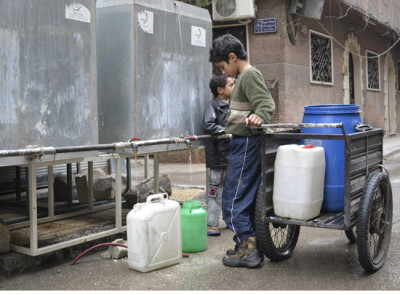LATEST: Jabhat al-Nusra Claim Cut-Off of Water to Important Regime Base
This morning the Assad regime puts out one of its periodic declarations of assistance to the Yarmouk section of Damascus — once home to 200,000 people, most of them displaced Palestinians — with the announcement of up to 60,000 food packages.
The proclamation stands in stark contrast to a report by the Palestinian League for Human Rights on the Assad regime’s approach to the area, held by insurgents since 2012:
The sieges are now in their third year and still increasing gradually. They began with restricting entry and exit then to forbidding it altogether, later forbidding supplies of all kinds and cutting electricity and communications, and finally cutting off the water supply.
The halt to water on September 8, 2013 has led to “a humanitarian catastrophe by every standard” for the approximately 18.000 people who remain in Yarmouk, according to the PLHR. Witnesses say “the hunt for water by every camp resident begins at dawn, especially for children and women, who go to other areas to acquire the bare minimum of water required for survival”.
Groups inside Yarmouk tried to use old wells, but these are far too few and are hindered by the sharp increase in prices for fuel needed to draw water. A resident explains:
The severe lack of water suitable for daily needs such as personal hygiene leads to the spread of disease, especially among children. The siege also affects the agricultural projects that some organizations carry out to ease the food deficiency, but the lack of water suitable for
irrigation threatens these projects and their crops.
A PLHR board member puts the regime’s declarations about its aid in perspective: “Even if [it] will allow some food shipments into the camp once in a while through its own organisations, this move will do little to ease the immense suffering. The water crisis will remain the most humiliating weapon of war.”
Yarmouk has also suffered from shortages of food and medicine. More than 90% of the pre-war population has fled, but of those unable to leave, about 200 died last winter from starvation, malnutrition, and lack of medical care.
The situation is unlikely to be eased this winter. Discussions of a lifting of the siege and a ceasefire, similar to arrangements in other Damascus suburbs, have not progressed, and the UN’s refugee agency is unable to work in Yarmouk.
The regime’s proclamation of its aid concludes with this ominous note, “Resolving the crisis in the Camp requires dealing with the issue of the gunmen in the surrounding areas of al-Hajar al-Aswad, al-Tadamoun, and Yelda, as they form supply lines for the terrorists in the Camp.”
(Featured Photo: PLHR)
Jabhat al-Nusra Claim Cut-Off of Water to Important Regime Base
Jabhat al-Nusra claim that they have increased the pressure on Syrian forces in the besieged Abu al-Duhur airbase, cutting off drinking water.
The Islamist faction said it captured the hill southeast of the runway, where the sole source of water is located. The position is also a prime location for attacking the airbase’s runways.
Abu al-Duhur is about 45 km (28 miles) southeast of Aleppo, on the edge of the country’s desert.
Photo: Iran’s Top Military Commander Soleimani with Grand Mufti of Syria
In light of the claims of the extent of Iran’s support for the Assad regime, an interesting photograph of General Qassem Soleimani — commander of Iran’s elite Quds Force — with the Grand Mufti of Syria aboard an airplane:
The photograph is likely to have been taken last week, when the Grand Mufti spoke at the Islamic Unity Conference in Tehran.
Video: Insurgents Set Up Refugee Camp in Latakia Province in Western Syria
A PR video for the construction of a refugee camp by the insurgent faction Ansar al-Sham in Latakia Province in western Syria:


